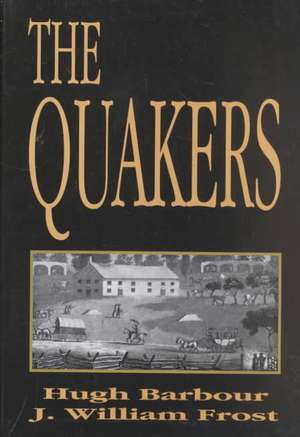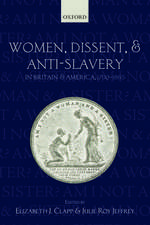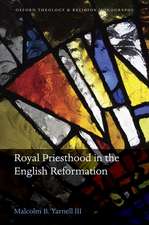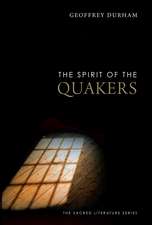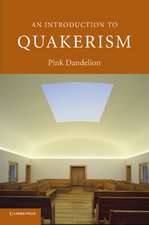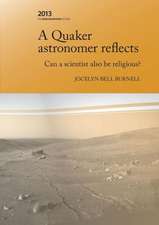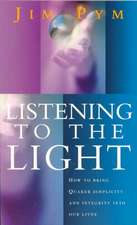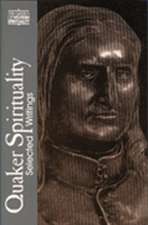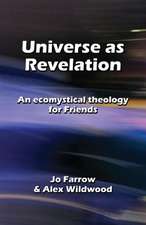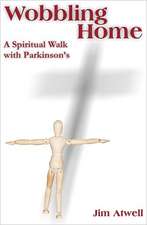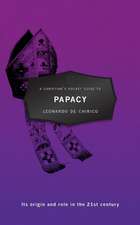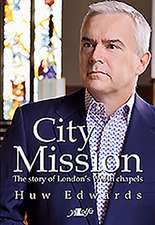The Quakers: Denominations in America (Hardcover)
Autor Hugh Barbour, J. William Frost, Hugh Barboiuren Limba Engleză Hardback – 31 oct 1988
Preț: 304.00 lei
Preț vechi: 522.22 lei
-42% Nou
Puncte Express: 456
Preț estimativ în valută:
58.17€ • 60.62$ • 48.16£
58.17€ • 60.62$ • 48.16£
Carte tipărită la comandă
Livrare economică 03-17 aprilie
Preluare comenzi: 021 569.72.76
Specificații
ISBN-13: 9780313228162
ISBN-10: 0313228167
Pagini: 421
Dimensiuni: 164 x 243 x 34 mm
Greutate: 0.79 kg
Editura: Greenwood
Seria Denominations in America (Hardcover)
ISBN-10: 0313228167
Pagini: 421
Dimensiuni: 164 x 243 x 34 mm
Greutate: 0.79 kg
Editura: Greenwood
Seria Denominations in America (Hardcover)
Descriere
From two professors of religion, a comprehensive history of the Society of Friends in the U.S. . . . The authors are careful to explain what Quakers believed at every stage of their development and how they organized their lives around the religious and social movements they fostered or fought against. The second part of this engaging book is a biographical dictionary of Quaker leaders. Reference Books Bulletin
This volume interweaves theology, social history, and biography in the first comprehensive history of Quakers in America to be published in more than forty years. Barbour and Frost treat all branches of American Quakers, tracing the history of the denomination from 1650 to the present and demonstrating how changes in the movement can be related to the traditions of the Society of Friends and developments in the wider cultural context. The text presents the lives and ideas of prominent Quaker men and women: George Fox, William Penn, John Woolman, Elias Hicks, Joseph John Gurtney, Rufus Jones, Henry Cadbury, and many others. The authors show that today although a Quaker can be fundamentalist, an evangelical, a moderate, or a liberal, the twentieth century has been marked by attempts to reunify and affirm a common tradition among all branches of the denomination.
After initial chapters dealing with the genesis of Quakerism under George Fox in Puritan England, the authors turn to an examination of the Society of Friends in colonial America. They reveal the Friends' creative response to persecution after 1660, the intellectual achievements of William Penn and Robert Barclay, and the creation of early colonies in New Jersey and Pennsylvania. Later chapters address the influence of Quaker pacifism and opposition to slavery, the establishment of Quaker communities in midwestern and western states, and the theological divisions within the Society of Friends that characterized the movement in the nineteenth century.
This volume interweaves theology, social history, and biography in the first comprehensive history of Quakers in America to be published in more than forty years. Barbour and Frost treat all branches of American Quakers, tracing the history of the denomination from 1650 to the present and demonstrating how changes in the movement can be related to the traditions of the Society of Friends and developments in the wider cultural context. The text presents the lives and ideas of prominent Quaker men and women: George Fox, William Penn, John Woolman, Elias Hicks, Joseph John Gurtney, Rufus Jones, Henry Cadbury, and many others. The authors show that today although a Quaker can be fundamentalist, an evangelical, a moderate, or a liberal, the twentieth century has been marked by attempts to reunify and affirm a common tradition among all branches of the denomination.
After initial chapters dealing with the genesis of Quakerism under George Fox in Puritan England, the authors turn to an examination of the Society of Friends in colonial America. They reveal the Friends' creative response to persecution after 1660, the intellectual achievements of William Penn and Robert Barclay, and the creation of early colonies in New Jersey and Pennsylvania. Later chapters address the influence of Quaker pacifism and opposition to slavery, the establishment of Quaker communities in midwestern and western states, and the theological divisions within the Society of Friends that characterized the movement in the nineteenth century.
Notă biografică
HUGH BARBOUR is Professor of Religion at Earlham College and Professor of Church History at Earlham School of Religion. His previous books include Quakers in Puritan England, Slavery and Theology: Writings of Seven Quaker Reformers, and Reading and Understanding the Old Testament.
J. WILLIAM FROST is Howard M. and Charles F. Jenkins Professor of Quaker History and Research and Director of the Friends Historical library, Swarthmore College. He is the author of The Quaker Family in Colonial America and editor of numerous volumes, including Quaker Origins of Antislavery and The Keithian Controversy in Early Pennsylvania.